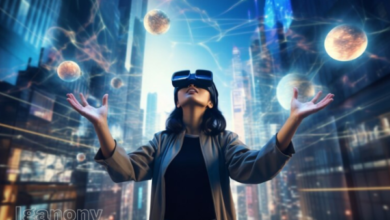The Role of AI in Modernising the Travel Industry

Technology, in general, and, more specifically, Artificial Intelligence (AI), is revolutionising different fields. Since the introduction of AI technology, the travel industry has been one of the most affected industries. That is a true AI because it covers everything, from planning a trip and getting a map to getting to your destination and enjoying the trip. In this blog, you will learn how AI revolutionises the travel sector.
Personalised Travel Planning
AI contributes to trip planning in several beneficial ways. Travel companies employ AI to understand statistics about previous trips. The benefits they consider involve the traveller’s mode of travel and the activities they engage in, among others. Thus, they are able to construct their itineraries. For instance, if you prefer adventure trips, AI can recommend places and activities for a specific user.
There is also the category of travel applications that use artificial intelligence. Some of these apps engage users through the use of chatbots. Here, you can have a conversation with the chatbot concerning flights, hotel accommodations, and places of interest. The chatbot is helpful for fast and specific answers, so travel does not take a lot of time and effort.
Efficient Booking Systems
Often, people book a flight or a hotel, which can become a somewhat troublesome process. AI makes this process easy and efficient. Price comparison is done by using AI algorithms from different websites. They look for the best prices for the flight ticket, the hotel to be booked and even the car rental. This is because the travel agent eliminates the need for the traveller to spend much time researching available transport since the agent has done that already.
Another aspect of using AI is its capability for forecasting price changes. It uses past information to predict the appropriate time when the price will be low or high. Travellers can choose to travel at specific times when it is cheap and get the best value for the money. Some AI tools even have price alert services. They alert travellers when there are significant price changes for the bookings they are interested in.
Enhanced Customer Service
Because the travel industry primarily involves dealing with people, the quality of customer service cannot be overemphasised. One way through which AI contributes is through customer service through the use of chatbots and virtual assistants. All these AI tools are provided constantly; they are available in the off hours, at night, and during the day. They can help to explain frequently asked questions, give information, and make bookings. If you are Muslim, you can even book Umrah packages all-inclusive from any online platform of a good travel agency. You can also set it in your task list so your mobile Ai application will finish it on time.
For instance, the AI chatbot can assist with changing a flight if the traveller has to do so. It can also help check an existing flight and even fix the ticket. This fast help improves travel. It also eliminates the need for human customer service attendants since most of the questions or inquiries would have been addressed.
Smart Recommendations
AI offers good suggestions to travellers. Accordingly, applying AI for restaurants, attractions, and activities can be recommended. If you are interested in history, AI can suggest nearby landmarks and relevant museums. When used, it can recommend nearby restaurants if the user is interested in food.
Therefore, all these recommendations are real-time ones. Many times, the consumer might use a review or rating to determine value, while advanced AI uses reviews, ratings, and trends. So, it will provide travellers with the best and most recent recommendation services. This makes travel more unique and fun, making the preferences of different individuals in a destination more distinct.
Improved Travel Safety
Security is a highly valued goal for every tourist. AI improves travel safety in numerous ways. AI systems check the weather and supply information as and when it occurs. If there is a storm or natural calamity, AI particularises or informs travellers. This assists them in decision-making and keeping away from risky incidents.
AI is also applied in security aspects, such as airport security checking. AI-operated facial recognition technologies take a shorter time to complete the check-in procedures. They ensure that only those who deserve to get on the flights get on the flights. This technology is effective in shortening the duration a client has to wait and improving the level of security.
Efficient Transportation
Artificial intelligence is transforming the means of transport in travel and tourism. GPS navigation technologies, self-driving cars, and the usage of artificial intelligence are increasing. Most of these technologies improve transportation safety and develop techniques that enhance the existing procedures.
Online marketplaces also apply heuristics where organisations like Uber and Lyft match up their service providers with consumers. They ensure the shortest time is used in travelling hence cutting costs. This facilitates a cheap and efficient means of transport, and any traveller can access it.
Data Security
The security of the information processed by smart devices is crucial for every traveller. Machine learning increases data protection by identifying and eradicating fraudulent activities. In this step, AI systems perform transaction surveillance and analysis to detect fraudulent activity. They also warn travellers and firms of potential security risks.
AI cannot also process personal data unsafely. Travel companies incorporate AI in information encryption to shield the data against cyber criminals. This creates credibility and reliability among the travellers that we, as tour operators, are legitimate and worthy of their business.
Future Trends
The usage of AI increases in the travel industry. Further improvements can be forecasted. AI-integrated VR/AR will become trendy. Customers can visually inspect places they wish to visit before they set out to visit them, enabling them to make better decisions.
AI will also advance language translation. Other technological advancements that will facilitate actual translation include the ease of using communication devices in foreign countries.
Conclusion
In many ways, AI is revolutionising travel services as a sector. It improves methods used in travel planning, booking, and customer relations. It recommends intelligent choices and increases travel safety. It tackles transportation and how AI can support the movement of people and goods in a way conducive to sustainability. It also makes data security possible.
The concepts of AI are not stagnant, implying that the travel industry will experience more innovations. These advancements will enhance travel experience, security, and tailored experience while using services. AI is revolutionising travel by providing solutions to all its hitches for all people.



